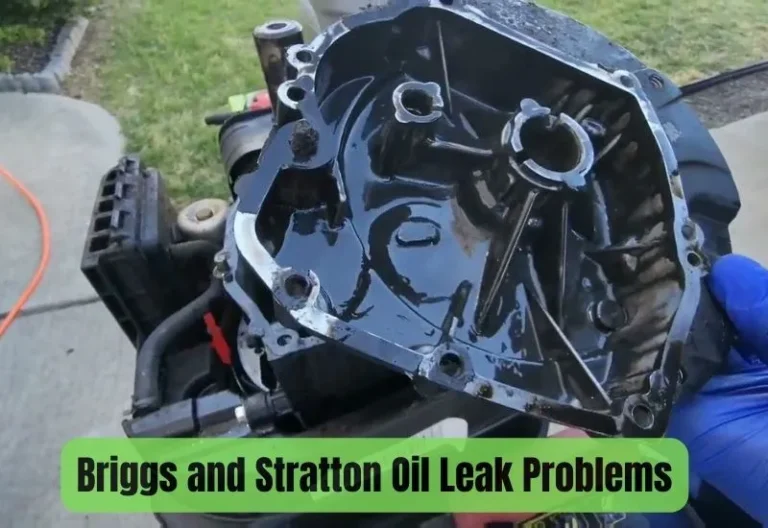Kohler Engine Runs Then Dies: What to Do?
It’s no surprise that both professionals and homeowners favor Kohler engines because of their strength, dependability, and efficiency. But, while running, a Kohler engine could occasionally have problems and stop working altogether.
Ones that frequently result in this kind of behavior are:
- Difficulties relating to fuel
- Issues with the ignition system
- Problems with air intake
- Mechanical difficulties
- Overheating
After reading this article, users of Kohler engines will learn the typical causes of why Kohler Engine runs then dies and how to resolve such a problem.

5 Reasons Why Kohler Engine Runs Then Dies and Solutions
Following is an overview of why the Kohler engine runs then dies and how users can solve the issue:
1. Difficulties Relating to Fuel
Fuel-related problems are one of the most frequent causes of a Kohler engine that runs for a while before dying.
A lack of fuel is a potential problem here. Low fuel levels in the fuel tank can prevent a consistent flow of fuel to the engine, leading it to run for a short time before stalling.
In such circumstances, it is essential to inspect the fuel level and top of the tank as necessary.
Carburetor issues can also mess up the fuel mixture, which can cause the engine to stall. It is the carburetor’s job to mix the fuel and air in the right proportions for combustion. The engine may not receive the correct fuel mixture if the carburetor is filthy or has broken parts.
Users can easily solve such an issue by using a carburetor cleaner to fully clean the carburetor and modifying the mixture and idle speed settings.
A professional carburetor adjustment is also required in specific circumstances.
Fuel filters that have become clogged over time can also be a problem since they block the flow of fuel and cause stalling in the engine.
If the users routinely check the fuel filters and clean or replace them properly, users shouldn’t worry about such an issue.
2. Issues with the Ignition System
Park plugs play a big role in creating the spark required for combustion. Nonetheless, over time, worn or damaged spark plugs could result in a weak or erratic spark.
Regularly check the spark plugs for wear or damage, and replace them if necessary. Additionally, make sure the spark plug spacing is set correctly following the manufacturer’s instructions.
Also, the engine may stall if the ignition coil malfunctions or breaks down, producing a weak or no spark.
To avoid this, users can use a suitable tool to test the ignition coils to verify if the coils are working properly. For appropriate ignition to be restored, changing the defective coils would be a great idea.
Furthermore, problems with the ignition system wiring, such as weak connections or damaged wires, may hinder the electrical flow and result in sporadic sparks or a loss of ignition.
Inspect the wiring harness and connections to make sure they are safe and damage-free.
3. Problems with Air Intake
Air filters are used to avoid dust, dirt, and other debris from entering the engine. However, with time, these filters may get filthy or clogged and block airflow.
It is worth mentioning that an unbalanced air-fuel combination results from restricted airflow because the engine doesn’t get enough oxygen. Because of this imbalance, the engine may operate badly and eventually stall due to a lean condition.
Regular air filter inspection and cleaning or replacement are essential for resolving this problem.
Physical blockages to the airflow in the intake system, such as trash, leaves, or loose parts, can restrict airflow. If the airflow gets blocked, the engine does not get the oxygen it needs to burn fuel. As a result, the engine starts running unpredictably and then stalls.
Check the intake system for any obstructions and remove them to avoid the problem by restoring proper airflow.
4. Mechanical Difficulties
When we talk about compression, we’re talking about the pressure that the combustion process puts on the cylinders of the engine. The presence of worn-out piston rings, damaged valves, or a broken camshaft, however, might not be apparent to the user right once.
Such symptoms are a warning sign that there is a compression issue, which affects engine performance and could result in lower power and engine stalling.
In extreme circumstances, such mechanical problems can call for an engine overhaul or repair advice from a qualified specialist.
When an engine runs unevenly, worn or damaged engine components like the connecting rods or crankshaft may be to blame.
These components might fail, which could cause vibrations, decreased power, and possibly engine stalling.
If you keep an eye on and maintain these vital engine components, you may be able to prevent mechanical problems.
5. Overheating
When an engine overheats, the cooling system fails to control the engine’s temperature properly.
This might happen if the cooling system’s one or more parts aren’t working well. Low coolant levels or a broken water pump, for instance, can make the system less effective at transferring heat away from the engine.
Besides that, the cooling passageways inside the engine or the radiator might get blocked over time through dirt, rust, or sediment accumulation.
These obstructions limit coolant flow, which hinders the fluid’s effective utilization and discharge of heat.
It is important to constantly inspect and repair the cooling system in order to address overheating problems.
This includes assessing hoses and connections for leakage, assuring proper coolant mixing, and checking coolant levels. Cleaning the radiator and cooling passageways are also necessary in this case.
Related Post: Kohler vs Briggs vs Kawasaki vs Honda Mower Engines– Which Engine Should You Choose?
Common Manufacturer Recalls for Kohler Engine
For new purchasers, it’s concerning when reputable brands issue recalls owing to faulty Kohler engines that run and shuts off unexpectedly. These are a few of those occurrences:
- Due to the potential laceration threat, there have been 10,000 recalls of Kohler engines that were sold with Husqvarna, Cub Cadet, and Troy-Bilt riding lawn tractors in 2011. The operator’s seat switch could malfunction due to a disconnected wire connector on the engine. When this occurs, the blades won’t stop, endangering users with lacerations.
- Due to the possibility of fuel leaks and fire dangers, Kohler recalls 24,000 of its gasoline engines in 2018. A defective fuel cap on the engine runs the risk of allowing the fuel tank to become over-pressurized, causing a fuel leak and fire hazard.
To avoid such issues, users of lawn tractors should stop using these engines right away and get in touch with a certified Kohler dealer or the retail store where they bought the tractor for a free examination and repair.
New buyers should study more on these issues before purchasing one.
Cost to Repair Kohler Engine when it Dies After Running for a While
Several factors, including the precise model of the Kohler engine, the severity of the issue, and the labor charges, might affect how much it costs to fix an engine that stalls after running for a while.
However, if you’re already considering fixing the Kohler engine components, rebuilding the engine might cost anywhere from $175 to $250 or more.
It’s necessary to remember that, especially if the engine is significantly damaged or old, rebuilding the engine might not always be the most economical option.
In some circumstances, it could make more sense to buy a new engine rather than rebuild the old one.
Related Post: 8 Most Common Kohler Engine Problems: How Do You Fix Them?
Kohler Engine Runs Then Dies – FAQs
Is there any chance that an electrical problem may make the engine start and then shut off?
Yes; a broken safety switch, such as a seat switch or a blade engagement switch, can break the electrical circuit and cause the engine to shut off.
Verify if these switches are in the right places and are operating as they should.
Could the engine run for a while before dying due to a carburetor issue?
Why not! Engine stalling can result from a dirty or broken carburetor disrupting the air-fuel mixture.
Avoid this issue by rebuilding or cleaning the carburetor.
What if the problem still exists even after checking these components?
In this case, it may be preferable to seek advice from a licensed Kohler service center or a competent mechanic who specializes in small engines.
They will be qualified to identify and address more complicated issues that might be causing the engine to operate for a while before dying.
Related Posts:
- Troubleshooting guide for common Kohler engine issues
- Understanding and fixing typical problems in Kohler 27 hp engines
- Fixing the most frequent problems with Toro zero turn mowers
- Troubleshooting guide for Toro zero turn safety switch issues
- Troubleshooting guide for lawn mower ignition switch issue






